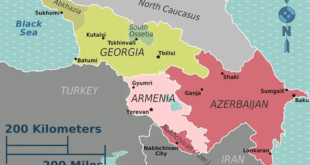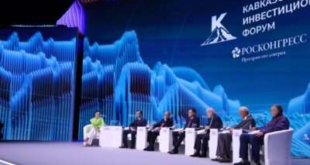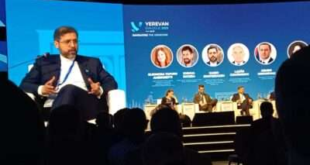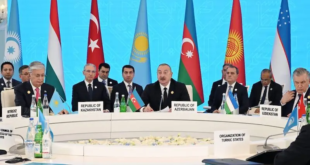 Dmitry Medvedev becomes the youngest Russian ruler since Czar Nicholas II during a Kremlin inauguration ceremony today.The 42-year-old lawyer’s swearing-in as president will kick off three days of pomp and circumstance that highlight the accomplishments of Vladimir Putin’s eight years in power and mark a dramatic turning point in the country’s history.
Dmitry Medvedev becomes the youngest Russian ruler since Czar Nicholas II during a Kremlin inauguration ceremony today.The 42-year-old lawyer’s swearing-in as president will kick off three days of pomp and circumstance that highlight the accomplishments of Vladimir Putin’s eight years in power and mark a dramatic turning point in the country’s history.
Â
The Russia Mr. Medvedev inherits is significantly different from the crisis-ridden chaotic nation Mr. Putin took charge of in 1999.
Â
Thanks to record-high energy prices, its economy is booming, liberal market reforms have taken hold, a new confident middle class is emerging and a more assertive Russia struts the world stage.
Â
It is no coincidence Mr. Medvedev’s inauguration week will end on Friday with a Victory Day parade that marks the anniversary of the end of the Second World War with a Soviet-style display of Russian military might in Moscow’s Red Square.
Â
On the other hand, the political freedoms Russians enjoyed under president Boris Yeltsin have been rolled back under Mr. Putin: Dissent has been discouraged; regional governors have had their powers curbed and now answer to the Kremlin; the State Duma, or parliament , has become a rubber stamp; and television stations and national newspapers are controlled by the state or Kremlin-friendly businessmen.
Â
Dissent still lingers, but seldom gets a chance to express itself. When the opposition group the Other Russia, led by former world chess champion Gary Kasparov, tried to hold an anti-government demonstration yesterday, police blocked it by arbitrarily confining some of its leaders to their homes.
Â
Last week, as Russians celebrated May Day, a traditional worker’s holiday, 50,000 pro-Putin demonstrators were allowed to march to Red Square, while 5,000 protesters and pensioners were quietly dispersed by police.
Â
The protesters carried portraits of former Soviet leaders Leonid Brezhnev and Joseph Stalin and waved placards reading: “No heat or light and a meagre diet — that is Putin’s prosperity.”
Â
For the most part, though, Russians are pleased with themselves and their country. Under Mr. Putin’s leadership, rebellious Chechnya has been pacified, wages have risen 800% and the economy has grown 600%.
Â
When Mr. Medvedev takes his presidential oath in Andreyevsky Hall, a czarist-era throne room, Russians will watch live on national television and take pride in their restored glory.
Â
They will also listen carefully to his inaugural speech to try and understand just how much power he will have as president.
Â
The bland bureaucrat and former head of Russia’s gas giant Gazprom never held elective office before he won a landslide election victory in March, after being handpicked by Mr. Putin as his successor.
Â
His first act as president tomorrow will be to recommend to the Duma that Mr. Putin become prime minister.
Â
That move could doom Mr. Medvedev to being little more than a figurehead president. What remains to be seen is how much power Mr. Putin will retain as he steps down. Mr. Medvedev has made a point of stressing he intends to rule Russia.
Â
In an interview with the Financial Times of London after his election, he insisted,
Â
“It is the president who sets out the main directions of domestic and foreign policy. He is the commander-in-chief, he makes key decisions on forming the executive. He is the guarantor of rights and freedoms of Russian citizens.”
Â
At the same time, he has repeatedly pledged to “supplement and develop” Mr. Putin’s programs, aiming to implement the broad guidelines his predecessor has established for Russia up to 2020.
Â
Mr. Putin will retain much of his influence and power as prime minister. He has already created a new press office for himself and staffed it with former presidential employees. Last week he signed a decree to shift supervision of regional governors to the government, rather than the president.
Â
“It’s not possible to talk of any real handover of power,” said Yevgeny Volk, director of the Moscow office of the Washington-based Heritage Foundation.
Â
“All the structures of power that were formed under Putin will remain in place. Moreover, Putin has taken all measures to ensure that in his new position as prime minister he will retain much of the powers he previously held as president.”
Â
Although Russian politics will remain opaque after Mr. Medvedev is sworn in, having two competing centres of power in the president and prime minister’s offices may inevitably lead to power struggles in the Kremlin, especially because Mr. Putin retains a strong personal power base as head of the United Russia party, which dominates the Duma.
Â
Some wags have compared the power-sharing arrangement between Mr. Putin and Mr. Medvedev to Russia’s coat of arms, which features the two-headed eagle of the old Russian Empire.
Peter Goodspeed
Source: National Post
Kavkaz Center
 Eurasia Press & News
Eurasia Press & News



